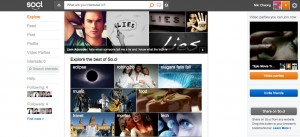By NIKI CHEONG
alltherage@thestar.com.my
I AM probably the last person to be asking this question, but do we really have time for another social network? I am referring to Microsoft’s new “social network” called So.cl (pronounced “social”), which was rolled out earlier this week as an “experiment”.
The initial reports on So.cl state that Microsoft is staying clear of any connections to known popular social network structures like Facebook. While it does require you to sign up for a profile and connect with people (using the same following/followers formula), Microsoft is selling it more as a search tool targeted, for now, at students.
Once you sign up for it and figure your way out through the clutter (it is a bit confusing at first), you’ll see why this is different from social networking as we currently know it.
But this article isn’t just about So.cl. I have long contended that the market is big enough for many social networks to exist concurrently. When I give my talks on social media, a recurring suggestion is for people to spend time trying out various social networks and see which ones work for them best.
There are many social networks that may not have the large numbers of Twitter or Facebook, but are thriving – especially those that exist in different cultural contexts.
Yet, I wonder if social networking has come to a point of saturation where users like you and I are starting to realise that we do know what to do with all its different forms. Social networking has moved away from its timesink status.
The many milestones that social networking has achieved over the past few years – through its use for education, activism, information dissemination and more – have shown that a lot of good and practical results can come from spending time on it.
While we used to have virtual pillow and food fights in the early days of Facebook, today, we are changing the world. I don’t mean to exaggerate; my point is that users these days appear to have taken a social deterministic approach to these networks and have learnt how to make the technology work for them.
This, of course, has led to the emergence of companies creating networks that serve as a “layer” above all the other popular social networks. That is how Microsoft is positioning So.cl – not as a competitor to Facebook, but as a layer above it.
Social photography apps like Instragram, timeline networks like Path and bookmarking sites like Pinterest essentially do the same thing – you function within each respective app (after all, social network sites remain in the numbers game for business purposes) but have the ability to share its content on your existing networks.
I would argue that this is a good thing because it allows users to find products which are most relevant to their interest and what they do, as opposed to a catch all site.
The problem, however, is how one manages all these. Because it is a business and most sites operate in isolation, I find that I have digital footprints all over the interwebs, many of which I am unable to maintain and control.
I just think of social networks that I have created but neglected over the past few years – Friendster (although I managed to download my profile), MySpace, Plurk and even Instagram, to name a few. While with some I have the option of deleting my profile, to do so would mean that a big chunk of my “social” prints from the old days will be missing. So I leave them there.
Then, there is also the problem with duplication. When I use sites like So.cl, Path or Pinterest, for example, I often share the content with my two basic networks – Facebook and Twitter. However, this also means that discussions and conversations regarding the same content could happen in various sites within the social networking ecosystem.
My concern is that if we see more of these “layer” networks emerging, this could be a major issue. How long before we forget, get overwhelmed and lose control?
Unfortunately, I don’t have a solution. The most ideal possibility is the emergence of an open and neutral web, where users don’t find themselves walled up behind networks like Facebook or Google+, for example, although it is unlikely that will ever happen.
What users can do now is to be more discerning when engaging in social networks by taking time out to figure out which networks work best for them, and how they plan to manage it all, rather than engaging them all for the sake of popularity.
It’s tough and possibly a lot of work – after all, social networking truly affords narcissicm – but considering the direction the technologies seem to be heading in, it might be the wisest route to take.
* Niki is an MA Digital Culture and Society student at King’s College London. Connect with him online at www.nikicheong.com and www.twitter.com/nikicheong.


Tell us what you think!